Evga 600w 80 Plus Standard Psu Review Reddit
This mail contains affiliate links. That means if you buy something I become a small committee at no extra cost to you.
I've seen poor quality power supplies fail in spectacular means.
In my years of Information technology work, the smell of burnt plastic from cheap power supplies dying was all also common.
For the fortunate ones, but the PSU was toast. For others, it took the motherboard with information technology.
It can be tempting to catch a $40 power supply and use the extra greenbacks toward a better graphics carte or bigger solid state drive.
Don't do it!
It's absolutely worth it to spend a piffling actress for quality when it comes to your ability source.
In the guide that follows, I'll detail what to look for in your power supply and whether Corsair or EVGA is a ameliorate choice for your PC.
Quick Option: The Corsair RM650x is quiet, reliable, modular, and has plenty of power for most PC'south.
AMAZON PRICE & REVIEWS
Watts vs Price – Finding the Right Balance
Power supplies reach every bit high as 2200W and can cost several hundred dollars.
Fortunately for your wallet, high stop power supplies are overkill for most PC's.
In fact, a 550W power supply is plenty for most gaming and productivity PC's.
Planning to overclock and/or go with the highest-stop single video card available? I'd pace up to a 650W or 750W model.
Beyond 750W is typically only useful if you're running multiple GPU's or CPU's.
The best way to ensure you select the right wattage is to use a reckoner.
Outervision'southward reckoner simplifies this. It allows for some "wiggle room" if you make small changes to your organisation in the time to come.
Hit the "Basic" tab on the estimator to a higher place, enter your build's details, and click "Calculate."
You lot'll be all set if yous option whatsoever model at or above the "Recommended" wattage given in the calculator.

Efficiency
All devices which run on electricity lose a sure amount of their power input.
If a PSU is lxxx% efficient, that means 80% of the power being pulled from the outlet is used and 20% is wasted.
Inefficient power supplies have a big touch on a PC.
Power lost to inefficiency is given off as rut.
More than rut in your PC means faster fan speeds to expel the hot air. This in turn creates more than noise. Too much rut and you'll run into stability issues.
Also, more than electricity is needed to output power to your components. If y'all run your system several hours a day, or 24/7, it'll have an touch on on your ability nib.
Thankfully, power supplies are much more efficient for the price than they used to be.
All good power supplies are given an efficiency rating based on the "80 PLUS" standard.
As the name suggests, to be given this rating the PSU needs to be at least 80% efficient.
Here's what the unlike levels look like:
- 80+ or lxxx+ White: fourscore% ability efficient
- eighty+ Bronze: 85% power efficient
- lxxx+ Silver: 88% power efficient
- 80+ Golden: 90% power efficient
- fourscore+ Platinum: 92% power efficient
- lxxx+ Titanium: 94% power efficient
To start with, I recommend no lower than 80+ Statuary.
The price difference between Bronze and a standard 80+ or a non-rated power supply from the same make is minimal. Y'all're likely to make up the modest price divergence over the lifetime of the reckoner in electricity savings.
Corsair and EVGA don't offer much in the fashion of Silver rated units.
80 PLUS Gold is the current "sugariness spot" for ability supplies.
There'south an efficiency proceeds of 10% over standard 80+ and 5% over Bronze.
The 80+ Gold units have ameliorate quality components and larger fans. All of Corsair'south and EVGA's Gold PSU's (except TX series) are efficient plenty that the fan isn't even needed at idle or during basic tasks like web browsing
Cost is a step up from Bronze models, only there are enough of choices for under $100.
How almost Platinum and Titanium?
These models are quite a bit more costly. In virtually cases wouldn't spend actress only for the sake of the extra efficiency.
With Platinum and Titanium PSU's, you do get the best quality components, a full set of features, and loftier power ratings.
Building a high-end system? You're typically looking at a $xxx-lxx price increase to go from a Gold to a Platinum/Titanium PSU. They'll generate a bit less rut and slightly reduce the power describe from the wall.
Like what y'all run into based on the features and ability rating? Does the price nevertheless keep you within your upkeep? The improved efficiency of a Platinum or Titanium PSU is a nice added bonus.

Not Modular, Semi Modular, or Fully Modular
Modular in this instance ways separate cables used to connect the PSU to other components.
Which blazon of cabling you choose depends mainly on your budget.
Non Modular
Basic power supplies will come with one large bundle of cables hard-wired to the ability supply.
This saves a bit on cost, so you'll meet not-modular cabling used in well-nigh entry level PSU's.
There are some downsides to having all your power cables hardwired:
- Unused cables remain inside your PC and have up space
- Air menses tin be affected if extra cables are left in the way
- All cables in the parcel are a fixed length
- Each component must be asunder to remove the PSU
While these are fairly minor problems for most system builders, y'all might find it worth spending a little actress if cable management is important to you.
Semi Modular
For what usually amounts to a modest price increase of $10-20, semi modular PSU'south make a big difference in cable management.
The main 24-pin ATX power connector is still hard wired – but since every motherboard needs this cablevision, yous wouldn't be leaving information technology off anyway.
Every other cable on EVGA and Corsair semi modular PSU's is optional.
If you have an 1000.ii SSD and no other drives, you can skip connecting the SATA cables entirely.
Single GPU systems can leave out the actress PCIe power cable that's meant for SLI and Crossfire setups.
Past using exactly every bit many cables as you lot need, you can avoid creating a rat'southward nest of wires inside your PC that restricts airflow. Plus, minimizing the cables just looks improve.
Semi modular is my go-to choice for value and usability.
Fully Modular
High end PSU'due south usually are fully modular, meaning every cable (including the 24-pin ATX) is removable.
I don't unremarkably recommend spending more money merely for the sake of upgrading from semi to full modular.
That said, possibly you already have your eyes on a certain model and it'southward fully modular.
If that's the case, there are some overnice things about every cablevision being removable:
- The PSU can be removed for cleaning or replacement with no rerouting of cables
- A longer or shorter 24-pin ATX cable can exist substituted
- Custom sleeved cables are more easily fabricated or purchased
Between semi and fully modular, the choice comes down to whether you want to accept the all-time possible aesthetic and cable management inside your build.
Adjacent Comparisons
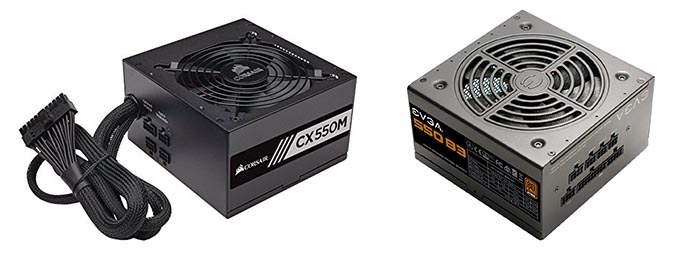
Corsair CX550M vs EVGA 550 B3
A 550W PSU is a bang-up option for the boilerplate PC.
The types of PC these power supplies are expert for:
- Low to mid-range graphics card
- Air cooling
- Minimal overclocking
- Running a few hours per day; powered off the rest
Let's wait at whether Corsair or EVGA is the better pick at 550W.
Ability and Efficiency
Both models here output 550W of continuous (not height) power. The single-rails 12V power output is identical on both at 45.8A.
They're both similarly efficient with 80 PLUS Bronze ratings.
Allow's movement onto what makes them different.
Features
The CX550M is a semi-modular ability supply, significant the 12V ATX cable is difficult-wired.
The 550 B3 is fully modular – the ATX cable is separate should you lot choose to replace it with a longer, shorter, or custom sleeved cable. The remaining connections are divided up into 5 modular cables rather than four on the Corsair, which tin help a bit with routing to SATA drives.
The 550 B3 has an Eco mode that tin be enabled with a switch on the back. This allows for silent functioning under low loads by halting the fan when information technology's not needed. This is not possible on the Corsair.
Value
The Corsair on average sells for about $5 less. If Eco mode and better cabling aren't of import to you, I'd salvage the money and become for the Corsair.
Otherwise, for the modest price difference I think EVGA is a better value hither.
Overall Winner: EVGA 550 B3
Check AMAZON'S PRICE
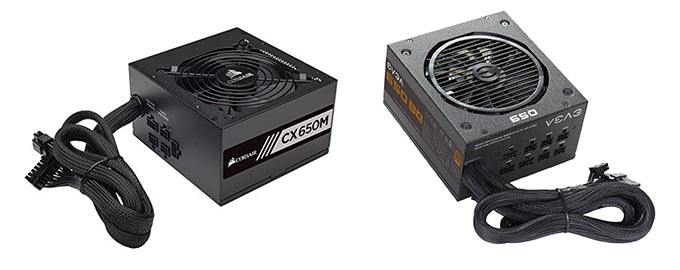
Corsair CX650M vs EVGA 650 BQ
650W PSU's are adequately pop in gaming PC'southward. They allow for some overclocking and can back up most any graphics card.
Here's the blazon of PC I'd recommend these 650W PSU's for:
- Mid to high-stop single graphics menu
- Air cooling or All-in-one liquid cooler
- Mild overclocking
- Running a few hours out of the day, otherwise off
Ability and Efficiency
The 650W rating on both models is the continuous power output rather than peak, which is skillful. The 12V rail output is the same between brands at 54A.
Both accept nigh the aforementioned efficiency and were given 80 Plus Bronze ratings.
Features
Features are very similar here.
Both have semi-modular cables. Neither model has an Eco mode for zero-RPM fan operation – look elsewhere if silent operation at idle and low loads is important.
The EVGA 650 BQ is well-nigh 25mm/1 inch longer, but houses a larger 140mm compared to Corsair's 120mm.
Despite this, the EVGA isn't much quieter. Both models take low dissonance levels upwards to near 350W, but get fairly loud under heavier loads.
Value
Both sell for identical prices, and offer 5-twelvemonth warranties.
Overall Winner: Tie, but I recommend skipping both models and moving up to an 80 PLUS Aureate PSU (TX650M, RM650x, or Supernova 650 G3)
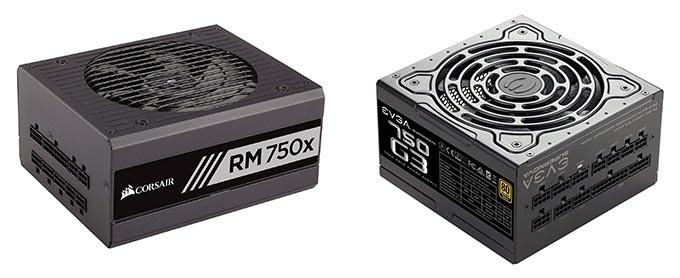
Corsair RM750x vs EVGA SuperNOVA 750 G3
A 750W 80 PLUS Gold power supply is my recommendation for most gaming PC's. They're a good option for many workstations also.
Here's where I'd recommend a 750W PSU:
- High end single GPU or two mid-range GPU's
- Air cooling or an AIO liquid cooler
- Overclocked CPU/GPU/RAM
- Running upwardly to 24 hours/day
Allow's run into whether Corsair or EVGA is the better pick.
Power and Efficiency
Continuous output (not superlative) is 750W as the names advise for both models. Corsair and EVGA each take unmarried 12V ATX rail at 62.5A and 62.4A, respectively.
Both PSU'south are 90 PLUS Gold rated. The EVGA is slightly more than efficient on average, but both perform very well.
Features
These are fully featured power supplies suited for most any PC.
The big deviation between brands hither is the noise level. The RM750x's fan profile keeps the fan speed at zero upward until effectually 350W of power draw. From there, it ramps up gradually and is still near-silent. Information technology'due south unlikely to be heard over other fans in your PC.
The SuperNOVA does take a zero RPM fan style every bit well, only beyond about 150W the fan starts to run. It ramps upwardly pretty speedily from there and unfortunately is quite noisy at 350W and across.
The fan on the Corsair is only slightly larger at 135mm vs 130mm; the noise effect seems to exist simply due to the fan profile of EVGA'due south PSU.
Both models have fully modular cables. EVGA includes half dozen total PCIe power connections (for three GPU'south) compared to iv with Corsair. Go along in heed if you plan to power 3 GPU's, they would demand to be somewhat low-end for this PSU to handle them. Otherwise cabling is like.
Length of the SuperNOVA 750 is a bit shorter at 150mm in comparison to 160mm on the RM750x.
Value
Both the RM750x and the 750 G3 accept excellent warranties at ten years.
Prices have fluctuated, but typically they're within $x of each other, with the Corsair often being slightly cheaper.
Due to the much quieter fan profile, I remember the Corsair is the better value here.
Overall Winner: Corsair RM750x
CHECK AMAZON'S PRICE
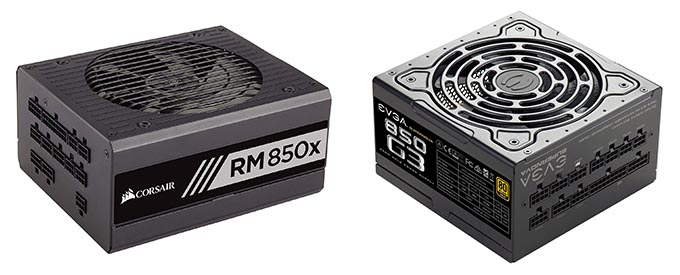
Corsair RM850x vs EVGA SuperNOVA 850 G3
Moving from 750W to 850W gives a chip more headroom for high-end hardware and overclocking.
Power and Efficiency
As with all other Corsair and EVGA models, power numbers are rated in continuous rather than pinnacle power. And then, you lot get the total 850W with both models.
These PSU's are both 80 PLUS Gilt certified so they're great for 24 60 minutes/twenty-four hour period utilize. Average efficiency is nearly identical.
Both the RM850x and SuperNOVA 850 output seventy.8A to their 12V rail.
Features
The Corsair and EVGA both are fully modular and have all the features you'd wait. They're both compact, with the RM850x beingness 160mm in length. The SuperNOVA 850 is even smaller at 150mm.
Equally we saw with the SuperNOVA 750, the fan noise is what sets these two models apart.
The RM850x is one of the quietest power supplies out there whether at medium or heavy load. The EVGA gets tranquillity load at anything but a depression load.
Value
Both models include a 10-year warranty, which is neat at this price point.
Prices take actually gone up on the SuperNOVA 850 over fourth dimension, with the RM850x typically being bachelor for $10-20 less.
Betwixt the louder fan noise consequence and the college price, I but recommend the SuperNOVA 850 if you have a compact case which tin can't fit a 160mm PSU.
Overall Winner: Corsair RM850x
Bank check AMAZON'S Price
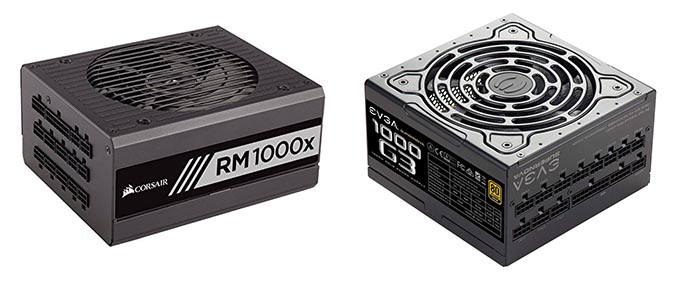
Corsair RM1000x vs SuperNOVA 1000 G3
High-cease system builders might opt for a 1000W ability supply. The number just looks impressive, doesn't it?
Hither'south the blazon of PC where it makes sense to spend the extra money on a 1000W power supply:
- Upwardly to two high-finish GPU'due south
- Air, AIO h2o, or open loop/custom liquid cooling
- Overclocked CPU/GPU'due south/RAM
- Running as much equally 24 hours/24-hour interval
Power and Efficiency
Corsair and EVGA both advertise their power ratings with a continuous value. That's good, because you lot can use close to the full 1000W instead of being misled by a "peak" rating.
12V rail output moves up to an impressive 83.3A with both models.
Average efficiency is very similar between the RM1000x and SuperNOVA 1000, with the SuperNOVA coming out a fleck ahead.
Features
Both the Corsair and EVGA are fully modular and compact in size. The Corsair was updated, reducing the length from 180mm to 160mm. The EVGA is shorter still at 150mm.
These PSU'south offer a fanless mode at depression loads.
I'm going to sound like a cleaved record here – but as with the other RMx vs SuperNOVA G3 comparisons, fan noise at medium to high load is much less noticeable on the Corsair. If dissonance is a concern, this should make the conclusion easy
Value
10 year warranties come standard for both these models which offers some great slice of heed.
Pricing of the two models was similar at release. However, the EVGA's cost has drifted upward lately and it's normally $15-20 more expensive.
Combined with the better fan profile of the Corsair, I simply recommend the EVGA if noise isn't much of a concern and you need a shorter 150mm PSU for your compact case.
Overall Winner: Corsair RM1000x
CHECK AMAZON'S PRICE
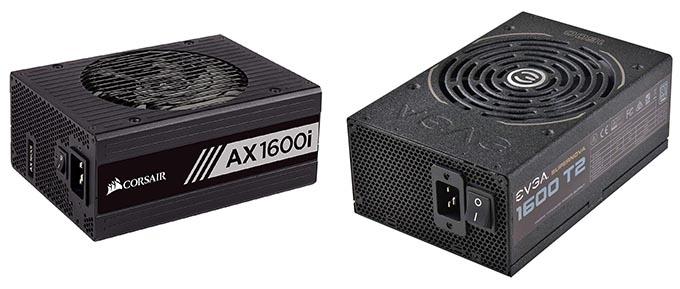
Corsair AX1600i vs EVGA SuperNOVA 1600 T2
Moving upward to the big leagues, nosotros have two powerhouse 1600W PSU's.
Keep in heed y'all'll come across better efficiency if you size your power supply appropriately, then don't go for a 1600W model when 1000W is plenty.
That said, here's the blazon of PC y'all might consider a 1600W PSU for:
- Three to Four loftier-end GPU'south
- Dual CPU'south
- Custom water cooling
- Extreme overclocking
Power and Efficiency
No messing around with ability specs. The advertised 1600W rating is bachelor as continuous power, rather than peak, for both brands.
When you're pulling a lot of watts, efficiency is important for both your power pecker and oestrus output. Better efficiency ways lower operating temps.
Both power supplies take been given the top 80 PLUS Titanium certification. Test results showed both the AX1600i and SuperNOVA 1600 T2 have fantabulous efficiency, exceeding their ratings in some cases.
The AX1600i comes out slightly ahead in boilerplate efficiency throughout its range. But, the SuperNOVA 1600 T2 is close backside it and still i of the most efficient on the marketplace.
12V runway ability is bonkers at 133.3A for both ability supplies.
Features
These, of course, are fully modular PSU's. They include plenty of PCIe and CPU/EPS cables to support systems with upwards to 2 CPU'south and four GPU's.
The fan in the Corsair stays nevertheless up to about 600W, while the EVGA doesn't run until 500W. The fan profiles for both models keep them very repose at everything brusque of nigh ~1400W. Noise level should not exist an issue with either PSU in normal use.
The standout between these ii models is that the AX1600i is a digital power supply while the SuperNOVA is not.
Digital PSU'south give y'all access to full monitoring of the power supply via software. In this case, it'south named Corsair Link. Yous can view output beyond the individual rails, temperature, fan speed, and efficiency. Very absurd stuff if you lot similar to monitor every detail of your PC.
Value
1600W PSU's can exist pricey, but they're however relatively affordable compared to other high end components such every bit CPU's and GPU'south.
There's a clear winner on value betwixt the two options compared here. The Corsair has been steadily dropping in toll, while the EVGA has stayed about the same since release. This puts the AX1600i around $100 cheaper on boilerplate.
Add in the fact that the Corsair is a digital power PSU with monitoring features and I think information technology's a much better value.
Overall Winner: Corsair AX1600i
CHECK AMAZON'S Toll
Warranty
We PC builders have it pretty skilful in terms of warranty.
Virtually premade computers (and electronics in general) take a pathetic 1-year warranty.
Not the case with ability supplies from a reputable brand.
Good PSU'south apply loftier quality components. They often last for the lifetime of the calculator. Since they last so long, the makers can afford to provide a long warranty.
Corsair and EVGA both give yous a 3-year warranty at the very minimum.
Going with a 650W or college 80 PLUS Bronze power supply gets yous a 5-year warranty on about units from either brand.
Well-nigh 80+ Gold PSU's from Corsair and EVGA include a 7-year warranty or better.
Finally, near fourscore+ Platinum and Titanium power supplies from either brand pace up to a 10-year warranty.
Which brand handles the process better? I've had good experiences with both, matching what I've seen of their reputations online.
Corsair quotes ane-two days for returns to exist processed while EVGA states ane-iii days is typical. Add on iii-5 business days for the replacement to be shipped to y'all.
Advanced RMA
I highly recommend an "Avant-garde RMA" aka "cross shipping" should you ever need to get a warranty replacement of a disquisitional component like a power supply.
Fortunately, both brands offer this.
Yous'll demand a credit bill of fare for this process. The manufacturer places a hold on your card – usually effectually the MSRP price of the PSU. This is just in instance y'all never send back the defective power supply.
Corsair/EVGA ships out a new power supply so yous tin can go up and running faster. Once they receive the defective part dorsum, they take the hold of your carte and you're done.
Obviously, your PC tin can't function without power. This is a great way to become support and running without a long await
Fans and Noise Level
Air cooling has come a long way, and power supplies have benefited greatly.
You won't find small, noisy, high-RPM 80mm exhaust fans in any of EVGA or Corsair's PSU'due south.
120mm fans are the new standard, with upwards to 140mm offered in higher-end models.
Larger fans offering more airflow despite lower rotational speeds. As a consequence, even under heavy load these power supplies don't generate a lot of noise.
If repose functioning is skilful plenty for you, no offering from EVGA or Corsair volition leave you disappointed.
Silent Operation
If your goal is to brand your PC equally silent as possible, it's a good idea to look at a midrange or amend model.
As you movement up through the product lines, some important differences can exist establish.
Offset, by stepping up from an 80 PLUS Bronze to eighty PLUS Aureate or higher PSU from either make, a zero RPM fan manner is fabricated possible on all except Corsair'south TX and CX series.
When the PC is idle or nether low load, the PSU fan doesn't even spin, which allows for completely silent operation. This is fabricated possible by improved efficiency and reduced heat output.
Beyond eighty PLUS Gold there's Platinum and Titanium. With these models, heat output is further reduced.
Some of these loftier-end PSU'south take larger 135mm or 140mm fans to farther reduce racket levels.
So, yous've decided noise level is of import and yous want to go with a more efficient model with a large fan.
Which brand should you go with?
Betwixt comparable models, Corsair'due south power supplies tend to produce less dissonance. The racket level of most EVGA models is average or below average.
If yous truly desire the quietest PSU while keeping the price in check, my top recommendation is the Corsair RM series.
Both Guru3D and TechPowerUp found RM series power supplies to exist some of the quietest they've tested, remaining nearly inaudible nether load.
Rails
In that location was a time when comparison power delivery specs truly mattered.
It was often recommended to seek out a multi-rail PSU versus single-runway to split up upwards the load and minimize hazard to components.
That's changed since the mid-2000's.
Now most quality power supplies, even at the loftier cease, are unmarried runway. They have reliable Over Current Protection (OCP) to protect your hardware.
Corsair, which sells both unmarried and multi-runway PSU'southward, even states single rail is merely equally safe.
So worry not – as long as you lot're meeting the power requirements of your system in watts, you lot'll exist fine with today's unmarried-rail ability supplies.
Form Factor
In that location take been a lot of different standards for PSU'due south over time, including EPS, TFX, LFX, CFX, and Flex ATX.
Fortunately PC builders actually merely need to bargain with one or two types: ATX and SFX.
ATX, a.k.a. ATX12V, is considered the standard.
Most desktop cases are mid-towers or total towers, where an ATX ability supply is the best choice.
This is the well-nigh common PSU type and then at that place are lots of options.
ATX ability supplies allow infinite for large fans for tranquillity, effective cooling.
While the size is fixed at about 85mm high and 150mm wide, the length of ATX PSU's can vary.
It's important to check the specs for your case to find the maximum size PSU that will fit. Some such every bit the Corsair HX series are 180mm or more in length, which may non fit in more compact cases.
Corsair's RM series gets my pinnacle recommendation in ATX PSU'south for features, efficiency, and very low noise.
SFX, a.k.a. SFX12V, is a small form factor ability supply.
These are used in Mini-ITX and SFF cases.
Size is fixed at 63.5mm loftier by 125mm wide. Certain manufacturers have modified the length (such equally SilverStone with SFX-L). Corsair and EVGA stick to a 100mm length, so they'll fit almost any Mini-ITX case.
The trade off to the more compact size is a smaller cooling fan. I recommend an 80 PLUS Gold rated SFX power supply or better to help with efficiency, heat output, and racket.
EVGA's SuperNOVA GM series is my option in SFX power supplies. Efficiency is splendid, and dissonance levels are lower than the Corsair SF series.
Conclusion
Whether you go with Corsair or EVGA, you'll get a quality power supply with a great warranty.
In general, EVGA's power supplies are slightly more efficient and compact in size.
On Corsair'southward side, many of their PSU's including the excellent RM serial are some of the quietest on the market place. Prices on comparable models are often a bit lower as well.
AMAZON: CORSAIR RM SERIES
wilkersontrablinever.blogspot.com
Source: https://vsearch.com/corsair-vs-evga-psu/
Belum ada Komentar untuk "Evga 600w 80 Plus Standard Psu Review Reddit"
Posting Komentar